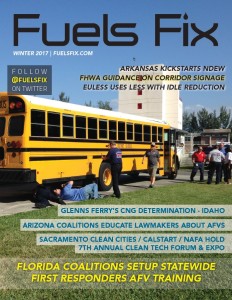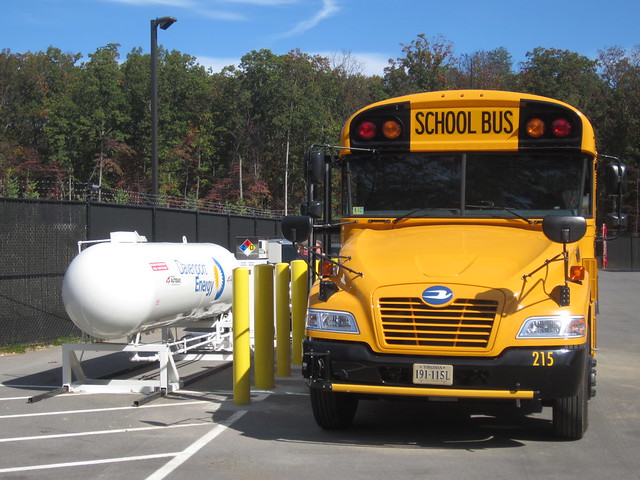Recent data from the U.S. Department of Energy (DOE) shows that gasoline consumed in 25 states and the District of Columbia contained more than 10.0 percent ethanol on average in 2015, demonstrating that the so-called “E10 Blend Wall” continues to crumble. The national average ethanol blend rate was 9.91 percent according to the DOE data. According to the Renewable Fuels Association (RFA), the data completely undermine legislation proposed by Reps. Bill Flores (R-Texas) and Peter Welch (D-Vt.) that suggests the ...
Continue Reading →Fuels Fix: Winter 2017 Edition
Millions in federal loans available for infrastructure
Monday, January 9, the U.S. Department of Energy’s Loans Program Office announced supplements to the existing Title XVII Innovative Clean Energy loan program (Title XVII) and clarifications to the Advanced Technology Vehicles Manufacturing (ATVM) loan program about the eligibility of alternative fueling infrastructure deployment and manufacturing.
https://energy.gov/lpo/loan-programs-office
Effective immediately, Title XVII, or Improved Energy Technology Loans, are available for eligible fueling infrastructure deployment projects, including the associated hardware and software, for hydrogen, electricity, natural gas, and biofuels.
In addition to providing loans ...
Continue Reading →Keep fuel economy standards to help our lowest income citizens
BY DAVID GREENE, OPINION CONTRIBUTOR – 01/11/17 07:40 PM EST
Strong miles per gallon (mpg) rules save Americans money across all income levels, but they save working families and middle-class Americans the most.
Since 1975, fuel economy improvements have saved over 1.5 trillion gallons of gasoline — about 5,000 gallons for every American.
Now, some groups see an opportunity in a new incoming administration to weaken or eliminate those standards.
If President-elect Trump truly cares about the nation beyond its wealthy elites, ...
Continue Reading →Question of the Month: How is fuel economy determined and reported for alternative fuel vehicles?
Question of the Month: How is fuel economy determined and reported for alternative fuel vehicles?
Answer: Last month we learned about how the U.S. Environmental Protection Agency (EPA) determines and reports conventional light-duty vehicle fuel economy ratings. While alternative fuel vehicle (AFV) fuel economy testing is largely similar to that of conventional fuels, the EPA makes some adjustments to account for different vehicle technology and fuel energy content. By tailoring AFV fuel economy testing and reporting, the EPA is able to ...
Continue Reading →Virginia Saves Funding available
Through the end of 2016, the Virginia SAVEs program closed six energy efficiency loans and saved borrower’s over $6 million in interest costs over the life of their project.
The program is still accepting new applications for projects in 2017. This is a great opportunity to significantly lower the borrowing cost to finance commercial scale energy efficiency, renewable energy, and alternative fuel projects in Virginia. Both private borrowers and local governments ...
Continue Reading →CNG Training & Certification Courses in Chesapeake, VA

This course presents an introduction to operating vehicles using compressed natural gas (CNG). Students are required to gain an understanding of CNG, regulations, component and line fabrications, driver education requirements, and diagnostic testing components. Students will apply basic competencies to grasp in-depth workings of CNG vehicles.
The course also combines classroom instruction and theory with the opportunity to apply concepts through hands-on activities with the TFC’s active ...
EPA Rebates Fund Clean School Buses in VA
The U.S. Environmental Protection Agency (EPA) on 1/24/2017 the award of more than $7.7 million to replace or retrofit 401 older diesel school buses. Four Virginia localities received funds, including the transition to propane buses in Roanoke County Virginia. The funds are going to 88 school bus fleets in 27 states, each of which will receive rebates through EPA’s Diesel Emissions Reduction Act (DERA) funding. The ...
Continue Reading →Northern Virginia LEAF Group Buy Program
Virginia Clean Cities is pleased announce to the extension of the first EV Group Buy Program in Virginia for the 2016 Nissan LEAF. This limited time offer leverages the power of a group of consumers to negotiate a discounted price from a car dealer.
We invite you to join us in participating in this EV Group Buy Program. This is community-wide program designed to make it easier and more affordable for residents to purchase an electric vehicle.
What is a Group ...
Continue Reading →DOE Announces $15 Million to Accelerate Adoption of AFVs
The U.S. Department of Energy (DOE) has announced $15 million, subject to appropriations, to support community-based projects to accelerate the adoption of advanced and alternative fuel vehicles and demonstrate energy-efficient mobility systems, including connected and autonomous vehicles, as well as new transportation system models.
The DOE’s Office of Energy Efficiency and Renewable Energy seeks highly leveraged “Alternative Fuel Vehicle Community Partner Projects” that will significantly accelerate the use of light-, medium-, and heavy-duty vehicles that operate on fuels such as biodiesel, ...
Continue Reading →


